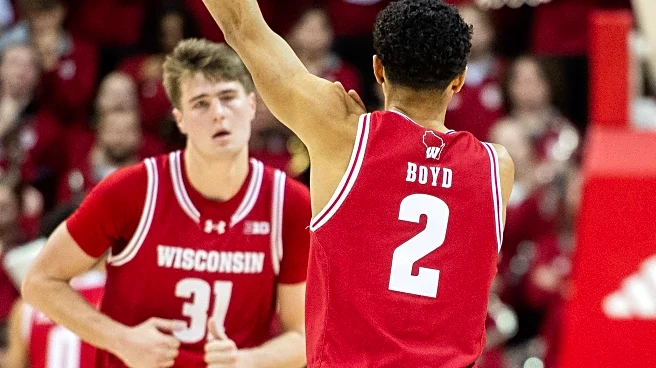What's Happening?
The Chicago Cubs have re-signed pitcher Colin Rea to a one-year contract worth $6.5 million, with a club option for 2027. Rea, who is 35 years old, has been a reliable presence in the Cubs' rotation, especially
during a season marked by injuries. He pitched 159 1/3 innings, ranking second on the team, and maintained a 3.95 ERA over 32 games, including 27 starts. His performance was particularly strong in September, where he recorded a 2.63 ERA. Additionally, Rea contributed in the postseason with two relief appearances, allowing only one run in six innings. Meanwhile, veteran infielder Justin Turner will become a free agent after the Cubs declined his $10 million mutual option, opting instead for a $2 million buyout. Turner, 40, had a challenging season, hitting .219 with three home runs and 18 RBIs in 80 games.
Why It's Important?
Colin Rea's re-signing is significant for the Cubs as it ensures stability in their pitching rotation, which has been plagued by injuries. His consistent performance provides the team with a dependable option as they look to improve their standings in the upcoming season. The decision to decline Justin Turner's option reflects a strategic move to free up salary space and possibly invest in younger talent or other areas of need. Turner's departure opens up opportunities for the Cubs to explore new options at the corner infield positions, potentially reshaping their lineup for better offensive output.
What's Next?
With Rea secured for another season, the Cubs will likely focus on strengthening their roster through free agency or trades, particularly in areas where they faced challenges last season. The team may look to bolster their offensive capabilities, given Turner's departure, and address any remaining gaps in their pitching staff. As the offseason progresses, the Cubs' management will be evaluating potential acquisitions to enhance their competitiveness in the National League.
Beyond the Headlines
The Cubs' decision to re-sign Rea and let Turner go highlights the team's focus on balancing experience with potential future growth. This move may signal a shift towards investing in younger players or those with high upside potential, aiming for long-term success. Additionally, the financial flexibility gained from declining Turner's option could be strategically used to pursue key free agents or extend contracts of emerging talents within the organization.










